Income disparities are not bad overall if it is based on skills, more skilled workers will be able to make more money if their output and outcomes are greater or have a more prominent impact. The biggest problem is when the disparity is too large that the one at the bottom cannot even afford a decent living as a human being. There are a lot of factors that contribute to income inequality over time. Education, anti union laws, advances in technology, discrimination, and demographic changes are some of the factors.
Education
College-educated people earn more than those with just high school diplomas. During the eighties and nighties, the median wage for people with high school diplomas decreased by 6% while the median wage for people with college diplomas increased by 12% (Mceachern 2006). You are paid by what society thinks that you contribute in terms of skills. If you are a doctor, you will be making more money than somebody doing manual labor.
In the United States, English proficiency could be another factor for low income. For example, a person from Mexico with poor English skills will earn 50% less than a native-born for the same job (Krugman et al., 2015). Also, immigration has increased income inequality because most low-skilled workers from abroad are willing to work for less to support their families in their native countries.
Anti-Union Policies
The trends of industry deregulation, freer international trade, and the decline of unionization contributed to the decreased demand for workers with less education (Mceachern 2006). Therefore, as pointed out in the previous point, education is vital to make more money. Also, the same unions were able to increase minimum wages for a lot of the workers in the past. Nevertheless, they have lost most of the power that they had over the corporations. The unionized workforce was 26% in 1973 while in 2002 was just 14% (Mceachern 2006).
Advancements in Technology
The demand for low-skilled workers has been affected by the development of computer information technologies that reduce company costs and make workers obsolete. Computers can produce more accurate information for managers and make the overall company more productive. As the demand for those jobs has decreased, the willingness of the companies to pay or increase those salaries has decreased.
Discrimination
Several studies have shown that minorities suffer persistent discrimination in favor of white males. Also, women earn lower incomes than men even when they have similar qualifications for the same work (Krugman et al., 2015).
Demographic Changes
As young workers tend to earn less than older and experienced ones, it can contribute to income inequality (Mcconnell et al., 2009). Besides, men and women with high earning potential tend to marry each other which moves them even higher in the income quintiles (Mcconnell et al., 2009). Also, other single-parent households will make less money because only one person is working while sustaining a family.
If the government outlaws some of these factors to create income equality there will be drastic consequences. For instance, people won’t be encouraged to do better and live and contribute to society their potential. Why go to college and spend most of your life paying student loans and studying to have the same income as the ones that did not go to school? However, some factors need to be addressed like the discrimination against some of the workers with the same skills because they are not being paid to their potential. Also, the same could be said about anti-union laws or agreements that reduce the leverage of low-income workers and keep them in the lower quantile of the income chart.
References
- Mceachern, William A. Economics: A Contemporary Introduction. Mason, Ohio, Thomson/South-Western, 2006.
- Krugman, Paul R, et al. Economics. New York, Worth Publishers, 2015.
- Mcconnell, Campbell R, et al. Economics: Principles, Problems, and Policies. Boston, Mcgraw-Hill Irwin, 2009.




